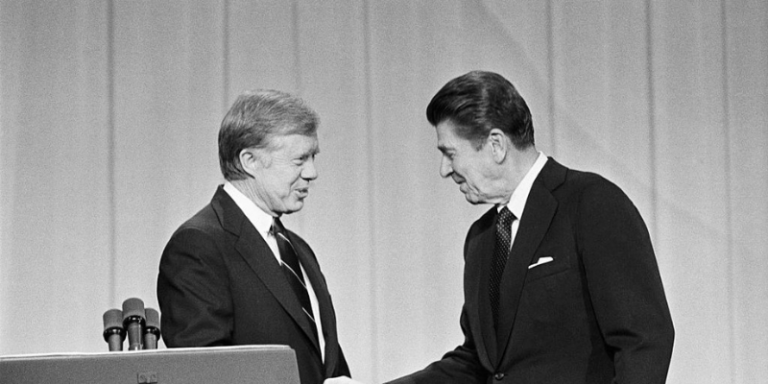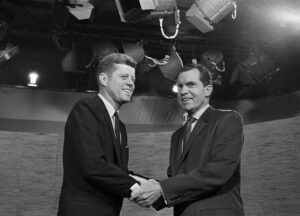Presidential Debates: Big Moments Can Cause Big Changes
Big presidential debate moments can be the deciding factor for undecided voters.
By: Jose Backer | October 26, 2020 | 458 Words

President Jimmy Carter and Ronald Reagan debate (via Getty Images)
Presidential debates can often help undecided voters decide who to pick on Election Day. Throughout the last 60 years, important debate moments have changed presidential campaigns and had essential effects on changing the American public’s perception of many presidential candidates.
Using Debates to Turn Heads
Former President Ronald Reagan was considered a master of debate, mostly for two critical moments in his debates against then-President Jimmy Carter and his Vice President Walter Mondale. Carter’s debate strategy revolved around attacking Reagan on his political record. Reagan’s immediate joking response of “There you go again” before answering the attacks made a huge difference. In this simple move, Reagan had corrected the record on an opponent’s attack while making that opponent seem serious and ill-tempered to viewers. After the debate, Reagan masterfully used his closing statement to stare into the camera and ask Americans whether the last four years under Carter had been getting better or worse for them. A simple question asked to the viewers demonstrated President Carter’s failures in foreign policy, economic policy, and domestic issues throughout his term in less than a few minutes.
Years later, when Reagan was running for re-election, his critics criticized his age and mental ability. In possibly the funniest moment in presidential debate history, he joked about Mondale’s youth and inexperience in response to a question about his age in the second debate. Both candidates’ campaign managers said that Reagan had immediately won the debate at that moment. Not long after, he won the election in another landslide victory.

Presidential candidates John F. Kennedy and Richard Nixon (via Getty Images)
Debate Image and Why It Matters
Image is critical to presidential debates, even though most people never think about it. In the first-ever televised presidential debate, Richard Nixon gave off an uninspiring image to potential voters with a suit that didn’t fit. He blended in with the background, his skinny appearance after leaving the hospital made him look small, and his decision not to wear makeup made him look sick and tired on stage. After the debate, polls showed Kennedy take the lead over Nixon, with viewers of the debate believing Kennedy had won. In contrast, listeners on the radio felt Nixon had won the debate.
Image means everything when people are watching. Candidates can project power, toughness, anxiousness, exasperation, and many more traits that viewers quickly pick up on. Although we like to believe that elections are always about choosing the most qualified candidate, our internal biases often lead us to vote for the candidate we relate with. Debates form images in voters’ minds, and while this effect is hard to put into statistics, it plays an essential role in deciding the winner of the election.
















